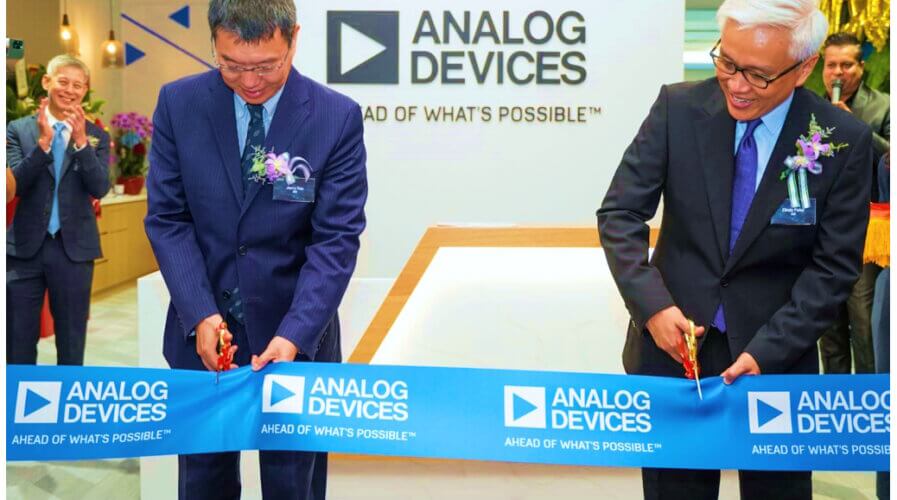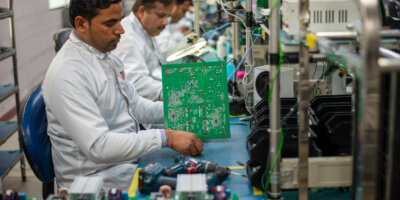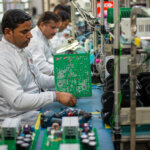
(Source – Analog Devices)
Analog Devices reaffirms its position in Singapore’s semiconductor market with a new facility
- The 38,951 sq. ft. facility located within the Kallang Industrial Park is planned to serve as a central hub for crucial divisions of the company, including R&D, test engineering, sales, and manufacturing.
- This latest strategic investment aligns with the company’s global expansion plans, which include enhancing its capabilities in the Asia Pacific region.
It was in 1995 when American semiconductor company Analog Devices Inc landed in Singapore. Over the last three decades, the company has steadily grown its operations and workforce, and this week, Analog Devices launched a new facility in the city-state that will serve as a central hub for its research and development (R&D), test engineering, sales, and manufacturing.
Analog Devices dubbed the new 38,951 sq. ft. space a state-of-the-art, environmentally friendly facility. Located within the Kallang Industrial Park, the facility will serve as a central hub for the more than 200 employees working in Singapore. The new strategic investment also coincides with the company’s global expansion plans, which include enhancing its capabilities in the Asia Pacific region.
The company’s President of Asia, Jerry Fan, said Analog Devices’ new facility is an essential milestone in its global growth strategy. “Enhancing our capabilities in Singapore is vital to leveraging the country’s superb talent pool and advanced manufacturing capabilities to serve our regional and global customers’ needs.”
“Our investment reinforces ADI’s presence within Singapore’s thriving semiconductor ecosystem, supported by the nation’s digital growth initiatives,” Fan noted in a May 31 statement. The new facility features a more spacious and advanced laboratory to foster interaction between the regional research and development team and customers.
Analog Devices also noted that site location selection and build criteria prioritized accessibility and sustainability. The new office is bicycle-friendly, close to public transportation, and directly accessible via expressways. Recyclable materials were used throughout construction, and energy-efficient AC, lighting, and water systems are all part of its advanced building automation system.
Low carbon footprint materials were an integral part of the biophilic interior design. Analog Devices said it plans to deepen collaboration with its customers and deliver innovative products for the Intelligent Edge through the facility.
In the new facility in Singapore, a dedicated space has been allocated for test development purposes within the new facility, custom-tailored to accommodate multiple automated test equipment (ATE) stations. “These on-site testing stations are designed to enable faster initial testing of ADI’s state-of-the-art products and accelerate the timeline of ADI engineering’s ability to meet customers’ toughest challenges,” Analog Devices said.
In the last couple of months, more Western chipmakers and related suppliers have been moving to increase production in Singapore. French substrate manufacturer Soitec plans on investing 400 million euros (US$430 million) to double the capacity of its wafer plant in Singapore. In comparison, US semiconductor manufacturing equipment maker Applied Materials has broken ground on a new S$600 million (US$450 million) plant in the city-state.
US-based contract chipmaker GlobalFoundries plans to build a US$4 billion plant in Singapore. A report by Nikkei also indicated how its logistics system in Singapore is efficient, allowing it to mesh well with customers in Taiwan, South Korea, and Japan. So far, the semiconductor industry accounts for 7% of Singapore’s gross domestic product.
Before this, when it came to the semiconductor supply chain, the city-state had been dwarfed by its regional peers. However, since chip nationalism began to gain momentum, Singapore has been attempting to shore up its electronics sector. The target is to grow its manufacturing industry by 50% by the end of this decade, with the semiconductor segment making up the larger share.
READ MORE
- 3 Steps to Successfully Automate Copilot for Microsoft 365 Implementation
- Trustworthy AI – the Promise of Enterprise-Friendly Generative Machine Learning with Dell and NVIDIA
- Strategies for Democratizing GenAI
- The criticality of endpoint management in cybersecurity and operations
- Ethical AI: The renewed importance of safeguarding data and customer privacy in Generative AI applications


